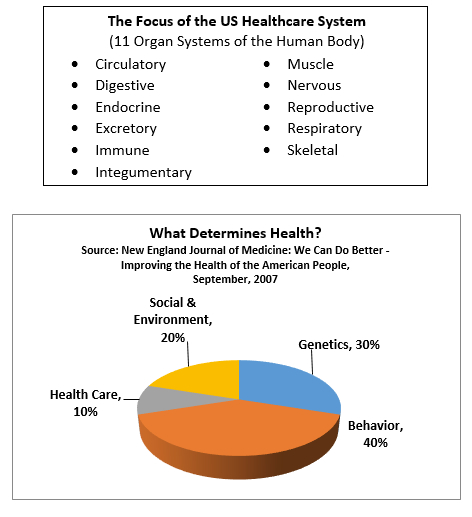It Takes A Village
Peer Family and Community SupportsPeer Family and Community Supports
The US healthcare system has a long history of overreliance on “health care professionals”–doctors, nurses, social workers–in contrast to most other countries, especially those with limited resources, where non-traditional health workers and community resources are critical parts of the system. This has resulted in a disproportionate focus on the eleven organ systems in the body and neglect of the social, environmental, genetic, and behavioral determinants of health. The following two diagrams illustrate this mismatch.

THIS IS CHANGING with recognition of the importance of peer and family support services in behavioral healthcare and community health workers in general medical care. Efforts in these areas are bringing a balance to the health system workforce, supporting healthcare professionals to operate at the “top of their licenses”, improving health outcomes, and helping address the cost problems with the US healthcare system.
Definitions
There are a number of important definitions that distinguish different aspects of peer, family, and community supports.
Peer: A person who belongs to the same age group or social group as someone else. (Merriman-Webster Dictionary)
Peer Support: “the process of giving and receiving encouragement and assistance to achieve long-term recovery. Peers offer emotional support, share knowledge, teach skills, provide practical assistance, and connect people with resources, opportunities, communities of support, and other people.” Mead, S. (2003); Solomon, P. (2004)
Peer Provider: “a person who uses his or her lived experience of recovery from mental illness and/or addiction, plus skills learned in formal training, to deliver services in behavioral health settings to promote mind-body recovery and resiliency.” SAMHSA-HRSA Center for Integrated Solutions, (2014)
Peer Support Services: intentional services based on the personal recovery based lived experience, training, and certification of the provider. These are designed to promote engagement, activation, recovery, and resiliency. Peer and family support services are not reciprocal, and the skills and degree of recovery between the provider and recipient are not the same.
Self-Help Groups: groups of people who provide mutual support to each other. In a self-help group, members share a common problem and support each other in healing and recovery.
Community Health Workers/Promotoras: individuals who promote health or nutrition within the community in which the individual resides.
Personal Health Navigators: individuals who provide information, assistance, tools and support to enable a patient to make the best healthcare decisions in the person’s particular circumstances and in light of the patient’s needs, lifestyle, combination of conditions and desired outcomes.
Health and Wellness Coaches: facilitate healthy, sustainable behavior change by challenging an individual to develop their inner wisdom, identify their values, and transform their goals into action.
